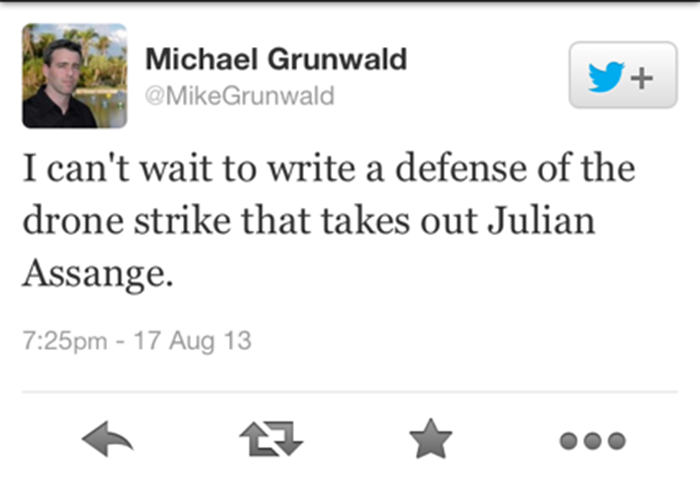
A Growing Culture of Violence Against Journalists
On Saturday, Time Senior National Correspondent Michael Grunwald tweeted, “I can’t wait to write a defense of the drone strike that takes out Julian Assange.”
He has since deleted the tweet, but the ugliness behind it lingers. Around the world journalists are facing threats, intimidation and violence.
In a few unfortunate cases, these threats come from other journalists like Grunwald. More often they’re attacks from outside the profession.
Just days before Grunwald’s tweet appeared, three journalists were killed in Egypt.
A few days before that, the New York Times reported that “[a]bductions of journalists inside Syria have increased sharply this year.” At least 15 journalists have gone missing in the country in just the last six months.
The Committee to Protect Journalists and Reporters Without Borders dubbed 2012 the deadliest year for journalists in recent memory. 2013 hasn’t been too great either.
On Sunday, British authorities detained the partner of Glenn Greenwald, the journalist at the center of the recent NSA revelations, for nine hours at Heathrow and questioned him under a British anti-terror law.
Having a journalist like Grunwald musing about violence against someone else is concerning. It's particularly troubling that the target of this journalist’s violent imagination is a person whose work has enabled critical reporting at newsrooms around the globe.
Regardless of what you think of Julian Assange, he and WikiLeaks are part of today’s networked fourth estate. That a leading journalist would muse about Assange's murder signals just how fundamentally our understanding of the press and press freedom has changed.
The New Yorker’s Amy Davidson helped connect the dots between the legal and physical threats to journalists:
Put those two halves together — pushing investigative journalism into the category of espionage and enemy activity; targeted killings to chase threats — and it seems possible that Grunwald could someday get a chance to write that defense, perhaps not with regard to Assange (we are not about to launch a drone strike on London, where he is now) but someone similar to him.
Davidson has her own debate about what it means to be “similar to him,” but in the digital age any of us could commit an act of journalism that puts us in the crosshairs of those in power. Consider Simon Glik, who was arrested for filming police in Boston, or Susie Cagle, who was arrested twice by Oakland police while trying to cover Occupy protests.
New participants in journalism — including citizen journalists, nonprofits and government-transparency organizations — are increasingly on the front lines and under increased scrutiny and threat.
“I can’t imagine a defense of a drone strike on Assange,” Davidson writes, “that would keep the people I work with every day safe.” It's not just those working full time in newsrooms who should feel chilled by Grunwald’s tweets; we all should.
Grunwald’s comments are part of a larger pattern of violence, intimidation and threats against journalists in the U.S. Earlier this month, during a fighter-jet simulation, the governor of Maine joked, “I want to find the Portland Press Herald building and blow it up." Some may write off both this comment and Grunwald’s tweet as just reckless and stupid, but we shouldn't be so quick to accept this kind violent rhetoric — especially when it comes from journalists and policymakers.
“A country's constitutional culture is made up of the stories we tell each other about the kind of nation we are,” wrote scholar Yochai Benkler.
Grunwald’s tweet was not just a dumb mistake. It was one example of a story that is being told about journalism today. Culture is most powerful when it normalizes what we once thought impossible to imagine. This was one of those moments.
We are facing a mounting press freedom crisis just as more and more people are making media and committing acts of journalism. Around the globe people are taking advantage of new digital tools to cover their communities and tell their stories. We should protect them against threats and fight for press freedom in all its forms.
If you want to fight intimidation and violence against journalists join our new campaign today.